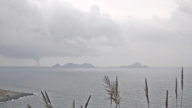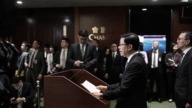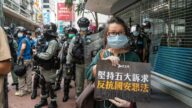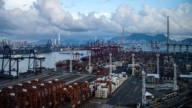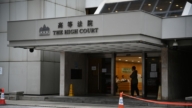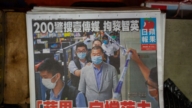【新唐人2014年05月27日讯】日前,2万名澳门市民走上街头,抗议政府专门制定保障高层官员福利的法令,及特首任内刑事豁免权。要求特区行政当局撤回关于“行政长官及主要官员的保障制度 ”法案。据说这是89民运以后澳门最大规模的示威。有人认为政府的做法没有道理,也有认为背后的原因不简单。
5月25号下午,两万名澳门市民穿着白衣,手持标语和澳门特首崔世安及其他高官的人像,高喊“崔世安撤回恶法,反对自肥”、“高官贪上脑,特首离晒谱”的口号,走向澳门立法会。澳门警方表示,反对法案的游行队伍高峰时有7000人,但是,发起游行的澳门民间团体“澳门良心”则表示,参加人数达到2万人。据说这是89民运以后,澳门最大规模的示威。
据了解,澳门政府向立法会提交《候任、现任及离任行政长官及主要官员的保障制度》草案,建议立法设立特首及9名主要官员的福利制度,包括,特首离任后可取得相等于月薪70%的补贴。
若以现任特首崔世安为例,他曾担任社会文化司长10年,可获700多万元的离任补偿,离任特首时,另可领取每月约18万9000元“长俸”。
而且,离任特首和主要官员,及其家属保留享有医疗护理、药物、外科手术及最高等级住院的权利。
民众认为这是官员的“自肥”之举。
大陆民主党人士陈树庆认为,澳门市民有权利游行抗议官员自肥的行为。
大陆民主党人士陈树庆:“因为官员他本身不创造任何社会财富,他都是一个地方,或者一个国家老百姓纳的税养活他们,那么给他多少工资的话,应该上是经过老百姓的同意,当然了这同意的程序会有议会表决,他们利用手中的权力制定一个规则,说自己可以多拿点钱,这个老百姓应该有权抗议。”
除工作条件和待遇的保障外,法案第四条还为特首提供司法保障。条文列明,除依照《基本法》程序予以弹劾并被中央免除职务者,“行政长官在任职期间内不适用刑事程序”。另外,特首在任期内可享有刑事豁免权。
香港《捍卫法轮功大联盟》创始人熊立认为,澳门政府提出了这么一条法案,背后的原因恐怕不简单。
香港《捍卫法轮功大联盟》创始人熊立:“可能背后有一定的政治的原因,我想是不是中共在背后做了一些动作,它担心以后这个政局不受控制,澳门的一些官员都涉及到一些贪污,腐败的问题,要查下去,可能会影响共产党控制澳门政府的稳定性,那么他们就出这么一招,不会是无缘无故的。”
据澳门网路媒体《论尽媒体All AboutMacau》报导,面对2万民众的抗议,25号晚上10点30分,三名行政、立法两会成员紧急召开了记者会表示,他们联名向立法会主席递信,要求全体会议议决“高官离补”法案,并且将法案送交一个委员会,以全体会议所指定的期限内,重新作细则性审议。
但是报导说,游行的发起者,澳门民间团体“澳门良心”成员苏嘉豪认为,行政及立法会成员的做法只是缓兵之计,他们和市民都不能接受。他指出,法案等于由一个黑箱交由另一黑箱审议,因为立法会只是一个“名存实亡”的监督机构。
苏嘉豪表示,“澳门良心”组织坚决要求特首撤回法案。
熊立:“看来这是一个新的动向,他要确保一些高官不下台,但是如果这些官员触犯了法律,那么你应该下台的就应该下台,必须按法律去办。如果是用这样的方法去保证他不下台,要维持他的既得利益、维持他的权利,我认为这就是一种不好的做法。”
澳门立法委员会将在27号表决是否通过法案。
苏嘉豪宣布,如果澳门政府在27号立法会召开大会前,仍不撤回“离补”法案,将于27号下午两点半起发起“包围立法会”行动。
采访/陈汉 编辑/田净 后制/萧宇
Macau: 20,000 People Protest Proposed Government Immunity Laws
20,000 Macau residents recently hit the streets in protest.
They are standing against government actions
enacting laws to protect the welfare of senior officials.
They are also protesting the criminal immunity
of the Chief Executive’s term of office.
They are calling for the SAR Administration to withdraw the
security system for the Chief Executive and principal officials.
It is said to be Macau’s largest demonstrations
after the 1989 pro-democracy movement.
Some people think the government’s approach does not
make sense, and the reasoning behind it is not simple.
On the afternoon of May 25, twenty thousand people
in Macau went to the Macau Legislative Assembly.
They were dressed in white, holding banners,
as well as pictures of Macau Chief Executive
Fernando Chui Sai On, and other senior officials.
The protestors were calling for
Chui Sai On to withdraw draconian laws.
They also protested against the self-enrichment,
and public corruption of senior officials.
Macau police said the parade opposing proposed
laws reached as maximum as 7,000 people.
Civil group ‘Macau Conscience’ reported that
the number of participants reached 20,000.
This is reported to be Macau’s largest demonstration
after the 1989 pro-democracy movement.
It was reported that the Macau government
submitted a draft proposal to the council security
system of the designate, incumbent and outgoing
Chief Executive, as well as principal officials.
It was proposed that the legislation set up a welfare system
for the Chief Executive and the nine principal officials.
This included that the Chief Executive may obtain subsidies
equal to 70% of a monthly salary, after leaving their position.
Taking Chief Executive Chui Sai On as an example, who
served as the social and cultural secretary for 10 years.
After leaving office, he will receive
compensation for more than 7 million yuan.
He’s also the outgoing Chief Executive, so can receive
a long-term monthly ‘pension’ of about 189,000 yuan.
Moreover, the outgoing Chief Executive,
principal officials and their families reserve
the right to care, drugs, medical and surgical
treatments in the highest level of hospitals.
Macau citizens believe that this
is the ‘self-enrichment’ of officials.
Mainland democrat Chen Shuqing believes that
Macau people have the right to protest this behavior.
Chen Shuqing, Mainland democrat: “Officials
themselves do not create any social wealth: it is
the national taxes of the people that feed them.
The salary should therefore be agreed by the people.
Of course, the Parliament will
vote on the consent procedures.
If they use their power to establish a rule that they
can earn more money, people have the right to protest."
In addition to safeguarding working conditions and
treatment, the fourth provision of the proposed laws
also provides judicial protection for the Chief Executive.
The provision stipulates that in addition to safety
from being removed from office by impeachment,
in accordance with ‘Basic Law’, ‘the Chief Executive
does not apply criminal proceedings during his tenure’.
The Chief Executive may also enjoy
immunity from prosecution during his term.
‘Hong Kong Falun Gong Concern Group’ founder
Xiong Li believes that the reason behind the Macau
government proposing such laws is not straight-forward.
Xiong Li: “There might be certain political reasons behind it.
I think it might be the Chinese Communist
Party (CCP) has undertaken some influence.
They worry that the political situation
is not under control, and some officials
in Macau are involved in corruption.
If this is investigated, it may affect the
stability of the CCP’s control over Macau.
This might well be the reason that they did this."
According to a report by web news site ‘All About Macau’
at 22:30 on May 25, three executive, legislative members of
the two organizations held an emergency press conference.
This was as they faced 20,000 people protesting.
They jointly handed a letter to the Chairman of the
Council, requiring a plenary meeting to resolve the
proposed subsidies laws for outgoing senior officials.
They asked for this to be handed in to a
committee for reconsideration during a
period appointed by all plenary sessions.
The news report suggests that the initiator
of the parade, Su Jiahao, a member of ‘Macau
Conscience’, believes that this is just a delay tactic.
The public do not accept it.
He pointed out that the proposed law is like the
consideration of a black box by another black box.
The Council is just an overseeing body ‘in name only’.
Su Jiahao further comments that ‘Macau Conscience’
insists on the withdrawing of the proposed law.
Xiong Li: “This seems to be a new trend. They want
to ensure some senior officials do not step down.
If these officials violate the law, then you
should step down according to the law.
If a law is implemented to ensure that he does
not step down, and maintains his vested interests
and rights, then I think this is a bad practice."
The Macau legislative committee will
vote on the proposed law on May 27.
Su Jiahao announced a plan if the Macau government
still does not withdraw the proposed law before the
legislative council convenes the meeting on May 27.
They will undertake surrounding the
Legislative Council on May 27 from 2:30 pm.
Interview/Chen Han Edit/Tian Jing Post-Production/Xiao Yu



